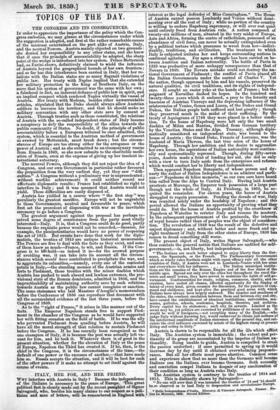TOPICS OF THE DAY.
THE CONGRESS AND ITS CONSEQUENCES.
order to appreciate the importance of the policy which the Con- gress embodies, we may glance at the circumstances under which the suggestion is adopted, and first at the rather remarkable causes of the mistrust entertained on the part alike of Austria, Italy, and the neutral Powers. Austria mainly objected on two grounds : she denied her responsibility to any other states, and she knew that if once the principle of accountability be adopted, the sharp point of the wedge is introduced into her system. Prince Metternich had, as Farini shows, definitively claimed to wield the influence of Austria beyond the geographical bounds of her own frontiers ; and so far has this interference been carried in Italy, that her re- lations with the Italian states are so many flagrant violations of publics law. Her treaty with Naples implied that she extended her military protection to the King of Southern Italy, on the score that his system of government was the same with her own ; a falsehood in fact, an indecent defiance of public law in spirit, and an implied compact which rendered Naples virtually the vassal of Austria. Her treaty with Modena, besides other unwarrantable articles, stipulated that the Duke should always allow Austrian soldiers to traverse his territory, and that he should make no military convention with any other state save by consent of Austria. Through treaties such as these constituted, the relations of Austria with the so-called independent states of Italy became A conspiracy to defy the responsibility of the allies towards the public community of States. No doubt, if the principle of public accountability before a European tribunal be once admitted, this system, which is essential to the Austrian method of government as avewed by Metternich, must break down ; but the circum- stances of Europe are too strong either for the arrogance or the power of Austria ; and as she submitted to an eleemosynary rescue from Russia in 1849, so she now submits to the charitable medi- ation of Russia, even at the expense of giving up her insolent in- ternational autocracy.
The neutral Powers, although they did not reject the idea of a Congress, and our own Government in particular rather favoured the proposition from the very earliest day, yet they saw " diffi- culties." A Congress without a preliminary war isunpreeedented ; without warlike achievements it could neither record nor effectuate diplomatic results ; France had established no right to interfere in Italy ; and it was assumed that Austria would not yield. These difficulties are easily disposed of.
Austria has yielded in a course where " the first step " was peculiarly the greatest sacrifice. Europe will not be ungrateful to those Governments, neutral and favourable to peace, which first set the precedent of dispensing with war as the inevitable ceremony to go before a Congress. The greatest argument against the proposal has perhaps re- ceived some degree of countenance from the party most vitally interested—Italy. It is, that a Congress could do no good, partly because the requisite power would not be conceded,—because, for example, the plenipotentiaries would have no power of reopening the act of 1815. But events have done that work for the diplo- matists, the treaties of 1815 are antique historical memoranda. The Powers are free to deal with the facts as they exist, and some of them know as much—France, to wit, and Russia. if the Con- gress is to Aheld—as indeed it is—for the avowed purpose of avoiding war, it can take into its account all the circum- stances which would have contributed to precipitate the war, and to aggravate its calamities,—namely, every one of the contested -points in Italy,—the standing menace of the Austrian armies and forts to Piedmont, those treaties with the minor duchies which Austria has pushed to such absurd and lawless extremes, the pro- visional state of the Roman dominions, admitted in 1856, and the impracticability of maintaining authority save by such relations towards Austria as the public law cannot recognize or sanction. The same statesman who laid Massimo d'Azeglio's memorandum before the Conference of 1856 can reproduce that document with all the accumulated evidence of the last three years, before the Congress of 1859.
- As to the "right of France," it arises in like manner out of the facts. The Emperor Napoleon stands free to support Pied- mont in the chamber of the Congress as he would have supported her with fitting occasion on the field of battle. If he was the ally who prevented Piedmont from quailing before Austria, he will have all the moral strength of that relation to sustain Piedmont before the Congress. If he has recently been recognized as the one champion of Italy, it is because the post was actually left va- cant for him, and he took it. Whatever there is of good in the present situation, whether for the elevation of Italy or the peace of Europe, Napoleon the Third has created it. If he, then, is the chief in the Congress, it is the circumstances of the time,—the default of one power or the excesses of another,—that have made him so. Russia accepts the situation, and it will be best for each of the other powers if it make no attempt to set itself against the course of events.


























 Previous page
Previous page